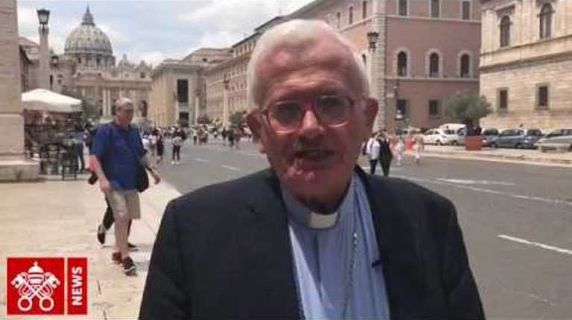The Vatican News interview with the Bishop of Lira, Msgr. Franzelli.
Here is the interesting interview by the journalist Giada Aquilino for Vatican News - Vatican City, to Msgr. Giuseppe Franzelli, bishop of Lira.
Uganda: after meeting with the Pope, bishops strengthened for today's challenges.
At the end of their ad Limina visit and after the Pope's audience, Msgr. Giuseppe Franzelli, bishop of Lira, Uganda, talks about the reception of migrants, the increase of kidnappings for ransom, the struggles for land control.
The management and solidarity for about a million and a half refugees, overwhelmingly South Sudanese, the commitment to fight organized crime and the scourge of kidnapping for ransom, increasing in recent years, the example of Ugandan martyrs , the first African Saints of the modern era to who Pope Francis paid tribute during his 2015 trip. These are the characteristics that distinguish Uganda today, which ended a twenty-year civil war in 2007, with a budget of at least 100 thousand victims and over a million displaced people. At that time, the so-called Lord's Liberation Army (LRA) by Joseph Kony systematically used the looting, the destruction of the villages and the forced enlistment of children and girls, to allocate them to their troops. Today the country has profoundly changed, but new challenges are opening up for the local Church. The local bishops spoke to them about Pope Francis last Monday, on the occasion of their ad Limina visit, which is coming to an end today. Of the two-hour conversation with the Pontiff, reports mgr. Giuseppe Franzelli, Bishop of Lira, in northern Uganda, from Brescia, originally from the African country in the early Seventies (Listen to the interview with Mgr Franzelli).
R. - It was a truly fraternal meeting. The bishops, as happened with the apostles, come to see Peter and exchange ideas, experiences on how the Catholic Church goes in that piece of the world that is Uganda. A country that the Pope has already visited: he came at the end of 2015 as a pilgrim to the Shrine of the martyrs of Uganda and on that occasion he urged us to live today the testimony of those martyrs, to be people who have the courage to testify Christ in today's society, in the midst of the difficulties that exist. And then, the audience echoed these things that the Pope had told us and we told him some problems that existed and we came out very comforted and encouraged by his example. He told us: "Here are the problems, we are trying to change, to improve, but I have not lost peace". And so this also gives serenity to us because there is certainly no lack of challenges in Uganda.
What are the challenges of Uganda today?
R. - We are in a situation that is no longer that of years ago. In 2006-2007 the war of the Lord's Resistance Army (LRA) ended: now Uganda, at least North Uganda, which was the part interested in this tragedy that lasted more than 20 years, lives in peace, in sense that you do not shoot anymore. But there is another type of war going on: I am referring to the question of the land that people had abandoned at the time of the conflict, seeking refuge in the camps for displaced people for months and years; then when the war was over, returning home, first they no longer found the house, but also the borders of the fields for example had been changed and things moved. Or those who had the courage to come back sooner, had started to cultivate there. For the sake of security and to fight the rebels, the army has also taken large areas, so there is now a lot of tension, even within the same families, because without land we do not live. Meanwhile, those in power have conceded or sold large plots of land to large companies and people feel thrown out. They simply can't stand these feelings.
You bishops have pointed out that there are also other challenges: that of crime and abductions which, for example, have increased ...
R. - Yes, especially lately, for a year now. These are abductions that in 90 percent of the cases end badly. In the sense that, whether people pay ransom or pay, the kidnapped person is killed. It is a phenomenon that has to do with crime, with the desire to gain, but it is difficult to discern if it does not have also some political reason for groups opposed to one another. And then, even now, lately, there have been cases of fake kidnappings, people pretending to have been kidnapped to get money, maybe even from their own families.
Uganda is home to over 1.4 million refugees mostly from South Sudan ...
R. –Now, they are certainly close to one and a half million, of which more than a million comes from South Sudan, concentrated above all in the West Nile. In this tragedy I would like to underline a beautiful thing, in my opinion, and that is the Uganda's capacity to welcome, also by the government with the help of international organizations and Caritas. And also the capacity for patience, tolerance by local people. Now is important to balance the help of refugees, and the help given to the local population. As regards the help of Caritas, an approach is being pursued that not only gives hospitality, but - in collaboration with the government - makes sure to give every immigrant or family groups a piece of land to cultivate.



